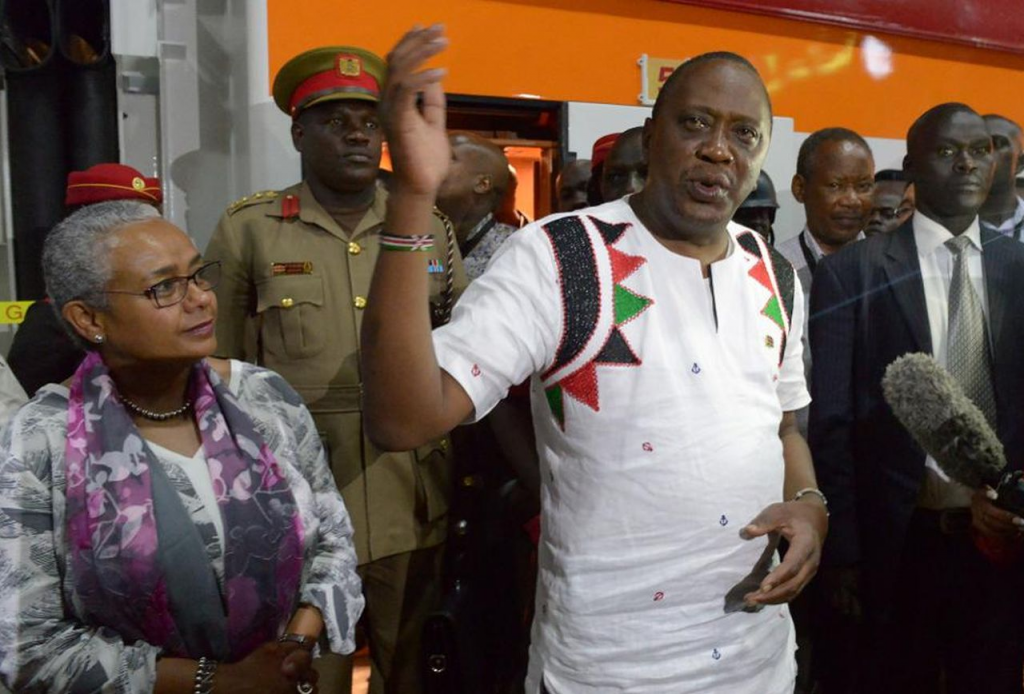It is an easy Sunday morning, 20th October 2019. Kenya is celebrating Heroes Day. I am lying full-length on the couch in the sitting room watching the television.
What arrests my attention is that the President is not wearing his usual suit as he is wont to do on such occasions. My take away from this fete is the president’s speech in which he has ordered all civil servants to wear nationally designed clothing on Fridays and during the holidays.
The idea is to boost the country’s textile industry. The order is part of Presidents’ so-called Big 4 Agenda.
I am not yet clear whether employees will be subject to disciplinary action if they do not comply. The President set an example during Heroes Day celebrations in the coastal city of Mombasa, wearing clothes made in Kenya. Cabinet members and other deputies also wore nationally produced clothing.
I further learn that an order was communicated by a circular signed by the country’s legal advisor. “In fulfilment of the Big 4 agenda’s goals, specifically the expansion of manufacturing and production of goods, and the creation of local employment, I order all civil servants to dress decently and casually on Fridays using clothes sewn and produced in Kenya.”
It’s confusing whether a “nationally designed clothing” is the same as a “national dress”. A National dress reflects the state’s culture and heritage. People intend to get hold of a national dress and hand it over from one generation to the other. We can easily recognize the nationality of a person from his/her dress as it differs from one country to another.
As a result of this distinctive feature, we can see the dressing of foreigners who have migrated to a country as different from its original people. There is no need to ask people to which country they belong because their national uniform gives the answer.
We have seen many expatriate workers in Kenya wearing their national dresses, especially during their national celebrations and other special occasions. By doing so people want to deepen their country’s cultural values in the minds of their children. It goes beyond national dress and covers customs and traditions.

Our appearance is greatly affected by the clothes we wear and it is because of this reason that a growing number of people have begun to question whether we should wear our traditional clothes or follow western trends. Youngsters today argue that we must learn to go with the flow and therefore taking up new trends is a better option.
A handful of people still believe that our traditional clothes represent our culture and identity and to let go of them will be like discarding our own culture.
However, some people feel western trends tend to offer freedom of expression. One can add his or her own tastes and ideas to them and they are quite classy, stylish and attractive. Following new trends helps people, especially teenagers, cope with peer pressure and it even results in the acceptance among liberal and contemporary people. This is because of the fact that it sets a good impression on others by signifying that you are very much in touch the world and come from a polished background.
Modern clothes are convenient, comfortable and give the option of changing the dressing style day in and day out.
Traditional clothes, on the other hand, represent our culture and identity. It is necessary to hold on to them if we wish to preserve our traditions. If we are not going to promote our customs then nobody will, and it is likely that it will become extinct.
Kenyans who travel abroad tend to adapt western trends prevailing there, forgetting their national identity and traditions. However, they should keep in mind that their identity is represented by the way they dress.
Read Also >> The political connections you need to be influential in Kenya
Furthermore, Kenyans wearing their traditional dresses symbolise unity. A research that I conducted on this subject showed that youth wearing traditional clothes, irrespective of western pressure, had fewer behavioural and emotional problems. The reason being that they are in touch with their ancestral culture, religion and traditions and thus not confused about their identity or who they are!
More than a celebration
I personally believe that we should keep a balance in all things and hence, it is inappropriate for one to completely set aside their traditional clothes and become a follower of western trends, or vice versa. We can still follow western trends but should not shy away from our traditional clothes. This way we will be following new trends, yet promoting our culture and be very much attached to our roots.
The whole idea of a national costume, in my opinion, is to express a dedication to a country, without having to say a thing. Also, when wearing it on occasions, to celebrate something related to national values.
National costumes are much more than just a celebration. They keep reminding us of important pages of history – how we were living in the past, what were our traditions, what we were wearing, and so on.
This is very good because it helps to save our culture overall and protects it from nasty other ones. It means that our costumes are independent and unique. Patriotism is the reason why national costumes are not forgotten. Even in some not quite official celebrations the national costume should be used. It is all about patriotism, celebration and making history.
Dress down Fridays a good idea
Attitudes towards dressing for organizations have changed significantly over the years. Once upon a time, most workplaces demanded suits, ties, dresses, skirts, pantsuits and other formal work wear. Casual Fridays have become a staple of many work weeks, but dress-down days can be extended to other situations as a way to reward employees for good work, thereby boosting morale.
Business Casual
For businesses requiring more formal business attire, dress-down days are designed to give their employees a break from the usual ties, pantsuits and other trappings. Casual business attire may involve khakis or slacks and a button-down shirt for men, pants or skirt and a nice shirt for women.
The type of organizations will help dictate what constitutes casual. Some have a casual dress code every day. For more formal businesses, Fridays are a popular choice as a casual day, but they can do it other times as a perk.
Rewarding employees
Casual Fridays are a way to reward employees continuously. It marks the start of the weekend with a reprieve from the norm. Dress-down days can be the occasion for company-wide charity fundraisers that help bring employees together in support of a good cause.
Casual days can also be a reward for reaching a sales goal, successfully concluding a major project or realizing any other achievement.
Generational issues
Workplaces with mixed generations also have to deal with contrasting ideas of what constitutes business casual. Older workers may feel a sport coat or suit jacket is still required; younger workers may be inclined towards jeans or shorter skirts.
Some older workers are more comfortable staying formal, even on casual days. Deal with these issues before they become a problem; communicate with employees about what is appropriate. Casual days are about improving morale, not fostering resentment.
Dress Codes
Dress-down days do not have to be free-for-alls. In some workplaces, it may be appropriate to wear slacks and a button-down shirt on casual days, but inappropriate to wear jeans, sandals or shorts. Don’t leave employees guessing. Determine what is appropriate for your kind of business and whether employees will be interacting with customers on casual days.
You still want to project a professional look to clients. Lay out guidelines for dress-down days in the formal business dress code and employee manual and cover the subject during training.
Disadvantages
The clothes that people choose as casual may reflect poorly on the company or business so it may lead to a situation where a code of what is not acceptable has to be introduced, reducing the effect of the casual day being introduced, especially in client-facing businesses. In these cases it may not be appropriate to instigate the policy.
Whereas most research showed improved effectiveness, others have suggested that when dressed casually there was the danger that employees could adopt a more relaxed and casual mind-set on the work they were undertaking, especially on a Friday afternoon.

Employees dressed in business casual attire while meeting with clients can give a less professional impression than your company might desire. Executives and employees alike often are resistant to a less professional look, afraid that they won’t be taken seriously.
Also, some employees prefer having to make fewer choices when dressing for work and appreciate the simplicity of a stricter dress code. Employees often are confused about what clothing is acceptable with a business casual dress code, as standards usually vary among industries and are not well-defined.
Benefits
Dress-down days are a morale booster that doesn’t require an investment from the business. Employees perceive casual days as a benefit and reward for hard work. It fosters a sense of community among them and allows them a little more personal expression.
Businesses in hot climates may implement dress-down seasons to make employees more comfortable during those times. Physical comfort can translate to greater productivity. Employees also appreciate the savings from buying fewer formal garments.
Employee expression equals productivity
Employees will feel like they are being listened to by the organization and, by wearing casual clothes (within reason) each Friday people will have a chance to express their individuality. This helps create a workforce that feels more in tune with the organization culture, thereby increasing loyalty and productivity.
Bonuses like dress-down Friday (which are very cost effective), motivates employees and has a positive impact on their work ethic for something other than financial gain.
Team Bonding
Casual Friday will promote a more relaxed attitude in the office at the end of the working week, especially if delivered with another perk like treats of 10a.m and 4pm tea. This will put staff in a good mood which will lead them forming new friendships and strengthening existing ones.
Teams that have better relationships work better together which also leads to good staff retention rates for the organization since friends for colleagues make for a much more enjoyable workplace.
Comfort
Dressing down or more casually makes for a comfortable day for employees, especially in hot weather. Wearing a shirt and tie or other business attire can be restrictive, thereby making for irritable staff and having a negative effect on morale and relationships.
It is especially more comfortable for those in an office environment, where people are surrounded by heat-radiating monitors and computers, often with poor air circulation.
Socialising
Friday is the most social day of the working week, with some offices taking part in after work socialising. Going to work already dressed in casual wear will put your staff in a more relaxed state of mind and encourage social behaviour, which again will lead to better relationships and team morale.
Setting of Boundaries
While generally, dress down Friday has positive effects all around, it’s also worth noting that having boundaries for suitable clothing is also a good idea so that employees know what is deemed as acceptable “dress down”.
Obviously, health and safety is important as well as being presentable, so wearing clothing that is neat, clean and tidy is a must. Employers need to take into consideration whether their staff’s choice in attire is too loud, short or revealing.
Casual or Dress Down Friday is a great, cost-effective way to boost a team’s morale. High emphasis should be placed on employee engagement.
Next >> Kenya Begins Importing Billionaires to Help Revive Economy













“Kenyans who travel abroad tend to adapt western trends prevailing there, forgetting their national identity and traditions. However, they should keep in mind that their identity is represented by the way they dress.”
You are already sticking out as a sore thumb in a foreign (non-black) country and there is no need to aggravate the situation further. It is unmistakable that you are from Africa, isn’t that enough cultural identity?
Robert if i was in countries that have black nationals for instance America or Britain how would one differentiate one from a Kenyan?
We have American blacks and also black Britons. National dress would be a pointer to your origin Robert